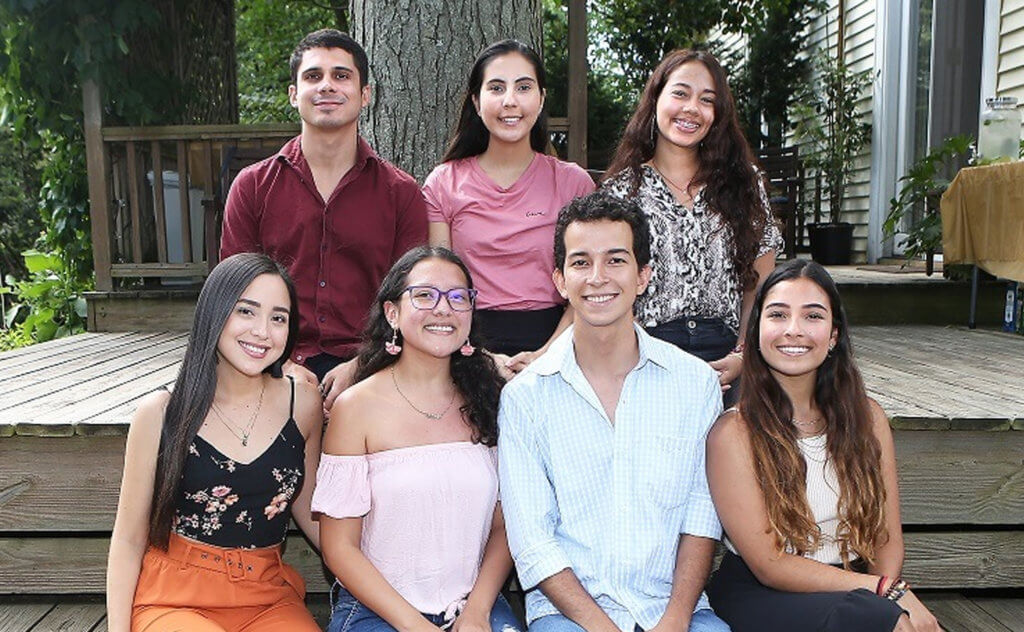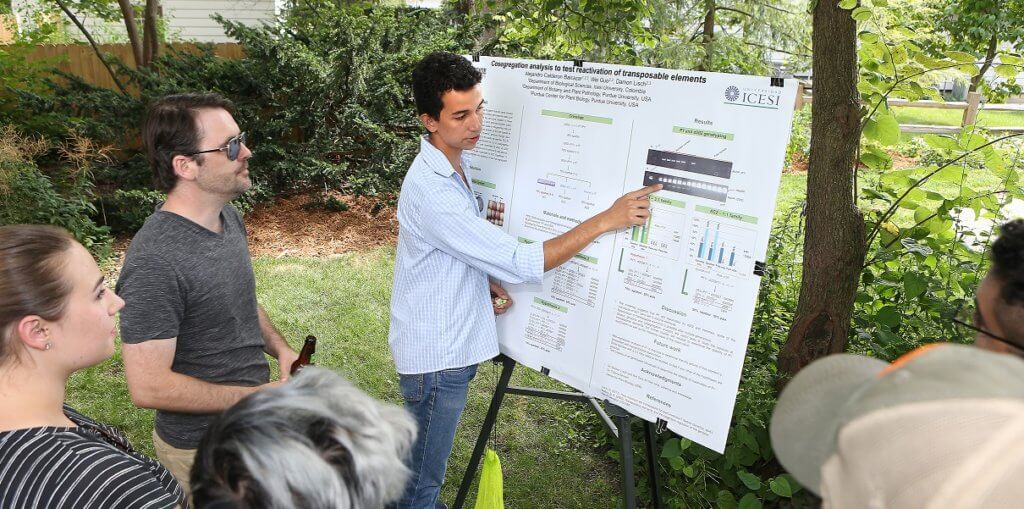Summer internships introduce Colombian students to research at Purdue

Several of the seven students from Icesi University in Cali, Colombia, who completed 10-week research internships at Purdue this June and July are already making plans to return to West Lafayette.
Icesi requires its seniors (fourth-year students) to complete a six-month internship before graduation. Alejandro Balcazar, who conducted research with Damon Lisch, associate professor of botany and plant pathology, hopes his work this summer has laid the groundwork for the longer internship. Balcazar has been talking to some Purdue faculty “to see if my interests fit with what they’re working on,” he says.
The senior is interested in combining genetics and ecology. The research he did in Lisch’s lab on how transposable elements cause changes in gene expression and function in corn was completely new to him and “a very fulfilling experience,” he says.

His two months at Purdue were important not just academically but also personally, he adds. “I’ve never had an international experience. You are living on your own and being independent. Purdue has lots of students from different cultures, and getting to know them is interesting; sometimes it’s not what you expect.”
Icesi students have visited Purdue since 2012, when Michael Mickelbart, associate professor of botany and plant pathology, established a connection with the Colombian private university during a Fulbright Visiting Scientist Fellowship. The initiative allows Colombian students to engage in laboratory research, experience life at a large U.S. university, and develop relationships with students and faculty at Purdue. The Icesi students work in the lab of a Purdue faculty researcher, usually under the guidance of a graduate student or postdoc mentor. They conduct independent projects and present their work in a poster session at the end of the summer.
Faculty mentors this summer included Lisch; Mickelbart; Sharon Kessler, associate professor of botany and plant pathology; Sujith Puthiyaveetil, assistant professor of biochemistry; Kranthi Varala, assistant professor of horticulture and landscape architecture; Josh Widhalm, assistant professor of horticulture and landscape architecture; and Cankui Zhang, assistant professor of agronomy.
“I am really interested in coming back to Purdue for grad school, either for a master’s or PhD,” says fourth-year biology major Laura Amaya. “We found so many nice people who wanted to help us. That made me feel very comfortable here.”
Amaya studied the role of photosynthesis in plant development in Puthiyaveetil’s lab. Her studies so far have focused on plants, so she plans to complete her six-month internship at a zoo in Cali. Once she graduates, she says, Purdue will be on her shortlist for graduate study.
Purdue’s labs are larger than those at Icesi, but Maria Bahamon felt quickly at home with Widhalm and graduate research assistant Rachel McCoy. Their research on gene expression in plants, specifically tobacco and Arabidopsis thaliana, was new to Bahamon. “I knew the theory but I’d never done it before,” she says.
The research suited Bahamon, who plans to earn a PhD and work in industry. She, too, hopes to return to Purdue for her longer internship. “I already talked with my advisor,” she says. “I like to work in the lab of Josh, and I have a really good relationship with Rachel — I really like my lab team.”
The Icesi students agree they most missed their families and the food of their home country this summer, but appreciate the opportunity to work in Purdue’s labs. The students generally fund their internships, although their advisors and departments provide a small stipend to cover some living expenses. In 2018, the Department of Botany and Plant Pathology largely funded the initiative, and in 2019, the Center for Plant Biology took over the administration of the program.
Mickelbart works with the visiting students on conducting research, proposing and testing hypotheses, and presenting their work. Planned social events give them insight into U.S. culture and recreation.
To date Purdue Agriculture has hosted 26 students who have worked in 16 labs in five departments in the college. Five Icesi students have returned to complete their six-month internships at Purdue. One summer 2016 intern, Katherine Rivera-Zuluaga, is a PhD student with Anjali Iyer-Pascuzzi, associate professor of botany and plant pathology, and this fall Mickelbart will welcome back one of his students from last summer as a new PhD student, also in Botany and Plant Pathology. Two students from this year’s group plan to apply for graduate school at Purdue.






